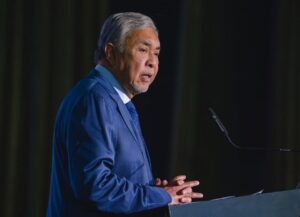KUALA LUMPUR: The abductions of Pastor Raymond Koh and activist Amri Che Mat have nothing to do with legacy issues, but are purely a legal process and a matter of human rights, said former Court of Appeal judge Datuk Mah Weng Kwai yesterday.
“It’s nothing to do with a legacy case or a non-legacy case.
“To me, this is all a matter of human rights and the rights of the families.
“Whichever government it is, the responsibility remains the same — to uphold the rule of law and respect human rights,” he told the New Straits Times.
Mah said this in response to remarks by Home Minister Datuk Seri Saifuddin Nasution Ismail on Thursday, who described the cases as “legacy issues” inherited from the previous administration.
The abductions, Saifuddin had said, occurred under the previous government in 2016 and 2017.
He also said he would meet officers from the Attorney-General’s Chambers (A-GC) who handled both cases to get a clearer understanding of what happened.
Mah chaired the Human Rights Commission of Malaysia (Suhakam) public inquiry into both cases, alongside Prof Datuk Dr Aishah Bidin and Prof Dr Nik Salida Suhaila Nik Saleh.
Suhakam’s inquiry in 2019 concluded that both Koh and Amri were victims of enforced disappearance carried out by the Special Branch, a finding now affirmed by the High Court.
“If the finding was that the Special Branch was responsible, and now the court is saying the same thing, then it really doesn’t matter which government it is,” Mah added.
On Wednesday, High Court judge Datuk Su Tiang Joo ordered the government to pay RM10,000 per day to Koh’s family, starting from the date of his disappearance on Feb 13, 2017, until he is found.
The judge also granted RM4 million in general damages and RM250,000 in legal costs to Koh’s family.
These, together with the daily sum to date, add up to about RM37 million.
The judge also ordered the government and the police to pay a sum of more than RM3 million to the family of Amri for failure to conduct proper investigations into his disappearance.
Following the High Court order, the government stated that it would appeal against the ruling.
Mah said the government, like any other litigant, had every right to appeal the decision.
“A decision has been delivered by High Court judge Datuk Su Tiang Joo. If the government is not happy with it, they have every right to appeal.
“People shouldn’t say, ‘Oh no, they shouldn’t appeal.’ If they don’t appeal, they have to pay up.”
Mah said filing an appeal was often accompanied by an application to stay the execution of the judgment, particularly to delay payment of compensation until the appeal hearing.
“An appeal doesn’t automatically stay the payment of compensation. The A-GC must apply for an order to stay the payment.
“Usually, when you file an appeal, you also apply to stay the payment until the appeal is heard.
“As for the families, there’s nothing much they can do except to wait and to defend the case in the Court of Appeal.”
Amri, a social activist from Perlis, and Koh, who founded the Hope Community organisation, were abducted in 2016 and 2017, respectively.
The Suhakam inquiry panel found “common features” between both disappearances, including the use of Special Branch resources and coordination.
Following the inquiry, the government announced the creation of a special task force to investigate Amri’s disappearance.
Citizens Against Enforced Disappearances spokesman Rama Ramanathan said it was the present government that refused to give the special task force report and the police’s standard operating procedure on investigating missing persons to the families of Amri and Koh for use in their civil suit against the government.
“The government still insists on classifying the report as an official secret, even though much of it has been read out in open court, and the judge has referenced it in his judgment.”
Rama said the government’s decision now to appeal against the High Court ruling sent a troubling message to the public and civil servants.
He likened the appeal to “defending the indefensible, even gross neglect and abuse of power by the police”.
He urged the families of the victims to view the appeal process positively and use it as an opportunity to strengthen their case.
“They should work to make their case stronger at the appeal.
“They should regard the Court of Appeal as the fourth honourable institution, after Suhakam, the special task force and the High Court to say the police, politicians and the cabinet did nothing after a large team of trained professionals openly carried out two abductions in our nation,” Rama added.
© New Straits Times Press (M) Bhd





![A fiery path of faith and renewal [WATCH]](https://prwire.my/wp-content/uploads/2025/11/A-fiery-path-of-faith-and-renewal-WATCH-300x157.jpg)
